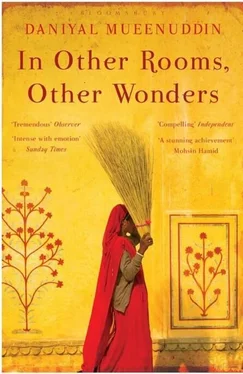He found the majordomo sitting in a chair under a tree, reading a newspaper.
‘Ah, the volunteer,’he said amiably. ‘Come on then, have a pull on the hookah.’
Rezak sat down on the edge of a charpoy, dangling his short legs. ‘I’m killing myself with this poison instead.’ He spat and then dipped green coarse tobacco under his gum.
‘You work up in Ayub’s sheds, don’t you?’
‘When Ayub needs me I work. He pays me in dying chickens and loose change.’ He tried to make a joke of it.
‘That’s what I hear — Ayub shaves both sides and then trims out the middle piece.’
Rezak laughed mirthlessly. ‘The way I’m going soon I’ll be eating grass.’ He paused. ‘I’ve been thinking, I can do woodwork, I know about trees. I’ll carry things, work in the garden. Feed me and I’ll work here and do whatever you want. You don’t even have to give me a room, I’ve got a portable cubicle that I live in, you can stick me in some corner.’
The owner of the estate, Sohail Harouni, son of a man who made a fortune in cement and other industries, had while at university in the United States married an American woman named Sonya. ‘No, I really love it here,’ she would say defensively when asked at a party. ‘It’s strange, it’s like a drug. I think I miss the States so much — and I do — and then after a month there I’m completely bored. Pakistan makes everything else seem washed out. This is my place, now. I don’t do enough, but I feel as if here I can at least do something for the good.’ She did fit in more than most foreign women, she studied Urdu, to the point where she could communicate quite effectively, made an effort to meet Pakistanis outside the circuit in Islamabad. Even her husband’s catty aunts admitted that she was one of the few foreigners who wore Pakistani clothes without looking like either an Amazon or a Christmas tree.
And yet, though she insisted that she loved Pakistan, sometimes it all became too much. ‘I hate it, everyone’s a crook, nothing works here!’ she would sob, fighting with her husband. Then she would storm out to her car and retreat to the Kalapani house, forty minutes away, arriving unannounced, withdrawing darkly into the master bedroom, while the servants scrambled to prepare her meal. In the evening she would wander the large stone house, slowly becoming calm, speaking with her friends on the telephone. Her husband would drive up to spend the night with her, bringing their little son as a pledge of their love, and they would make peace.
It happened that, soon after Rezak made his plea to Ghulam Rasool, Sonya had a huge row with her husband and ran away to Kalapani. The next morning, she sat drinking coffee on the sunny terrace, which had a view out over the government forest, now heavily logged by poachers, and then down to Islamabad and Rawalpindi. The strain of the fight had shaded into a desire for simplicity and order, an almost pleasant tearfulness.
Ghulam Rasool came up from the garden, coughing so that she would not be startled. Of all the servants he was the one she most trusted with her son. She herself felt comfortable with him, with his gentle, stoic manner, with his prayers and his superstitions.
Her blond hair held back by a black velvet band, she wore a simple white blouse, white slacks, and lay on a divan, immaculate, reading a slender volume of poetry — she had been an English major, and turned to a handful of familiar books as a restorative, Yeats or Rilke, Keats, to be taken as needed.
‘Excuse me, Begum Sahib. I wanted to ask, it’s time to think about the roses.’
She knew that he wanted to soften her attitude toward her husband. In any case, she liked him to come and talk with her, and they used as a pretext his supervision of the garden, although he had always been a valet and knew very little about flowers or trees. She put down her book and they considered the roses and the placement of the annuals.
‘Begging your pardon, the local people drive their goats into the Ali Khan orchard, and they’re destroying the saplings that you brought from America. There’s an old man, he can’t do hard labor, but he’s a reliable person. His family abandoned him. He even has his own portable hut — he’ll take it there and live as a guard. You don’t have to give him a salary. Just food and a few rupees for pocket money.’
But she wanted to give the old man the same as all the others. It made her happy to think of spoiling him in his old age.
Newly hired, Rezak moved to the Ali Khan lands, a walled parcel of four or five acres just up the road from the main house. Like the other servants and gardeners, he received a salary of nine thousand rupees a month, more than he had ever made in his life. The gardeners from the big house transported his cubicle in pieces, then helped him reassemble it next to a hut that was already standing there, a single stone-built room, with an open hearth, which Rezak could use as a storeroom and kitchen. The land had no electric connection, so he bought oil lamps, which glowed soothingly at night as he went about his last chores, his routine of dinner and bedtime.
The season turned hot just as Rezak moved to his new home, coloring the green fruit on the apple and peach and pear trees imported from America. He devoted all his grateful heart to the little orchard, watering the trees with a bucket from the stream that ran through the property, working manure into the soil with a spade. Taking a bus to Islamabad, with his own money he bought three grape vines, carried them back wrapped in straw, and trained them up the legs of his little tin-clad cubicle. He planted radishes, corn, cauliflower, onions, peas, more than he alone could eat, so that as they ripened he could take baskets of produce up to the big house. With his second paycheck he bought a goat for milk — before, in his previous jobs, it would have cost many months’ savings.
One day the master and his wife took some guests to the Ali Khan land for a picnic lunch. In the morning servants brought carpets and divans, tubs full of ice for the wine, grills for the meat, firewood in case the party lasted into the night. Rezak spent hours ferrying boxes and chairs and rugs down from the main road to the picnic spot, taking the biggest loads, pushing himself forward, claiming precedence on his plot of land.
The guests arrived, Pakistanis and foreigners, a dozen or so of them, and were soon sprawled on the carpets, drinking wine, resolved into several groups. Walking briskly down the steep path, sure-footed, holding a floppy yellow sun hat with a trailing ribbon in her hand, Sonya had said to Rezak as she passed, ‘ Salaam, Baba.’ His heart, his soul melted, as if a queen had spoken to a foot soldier. She had given him charge of the garden, of the trees that she brought from her homeland, and now she was seeing the results of his husbandry for the first time.
All the other servants knew what to do — Ghulam Rasool poured the wine and passed the hors d’oeuvres, a cook readied the fire and skewered kebabs on metal rods, the gardeners spread out as a kind of picket, to prevent anyone from looking over the walls. Rezak’s shyness and diffidence contested with a desire to take part, to show off all the work he had done in the orchard. He squatted under an apple tree, trying not to look at the Sahibs, pulling up sprigs of grass, tying them into figures and knots, hoping to be summoned. Restless, he knelt down by the cook and took over the job of tending the fire, pushing aside the weedy boy who acted as the cook’s helper.
Sohail Harouni was a handsome cheerful man with never a care in his life, who enjoyed giving parties more than anything else. After a few glasses of wine he called a young valet and told him to bring the stereo from the main house and hook it up. A driver raced to Murree, ten kilometers up the mountain, and bought a roll of heavy wire. Glasses in hand, the guests and even the host enthusiastically helped string the wire down through the trees from a roadside shop.
Читать дальше












